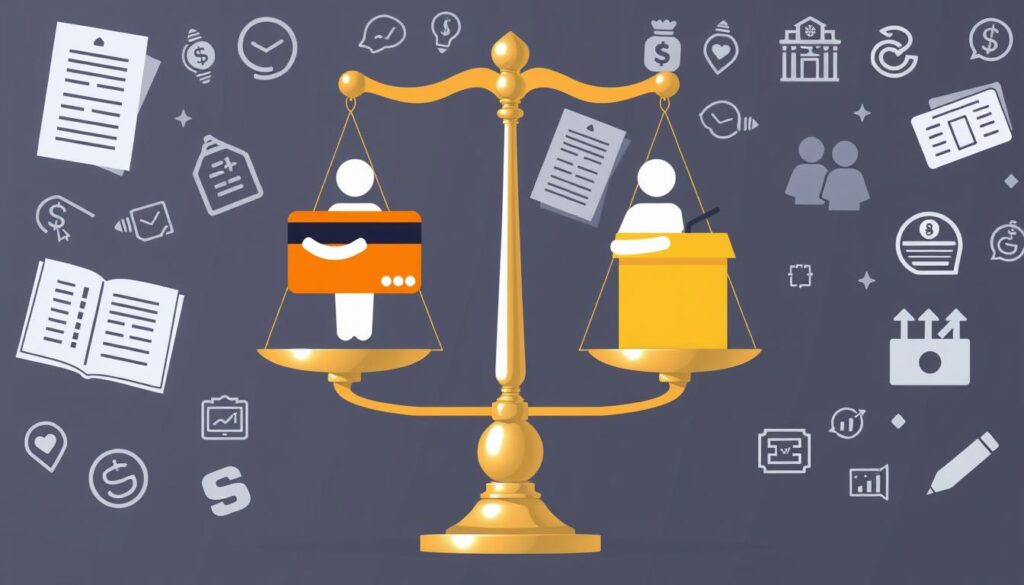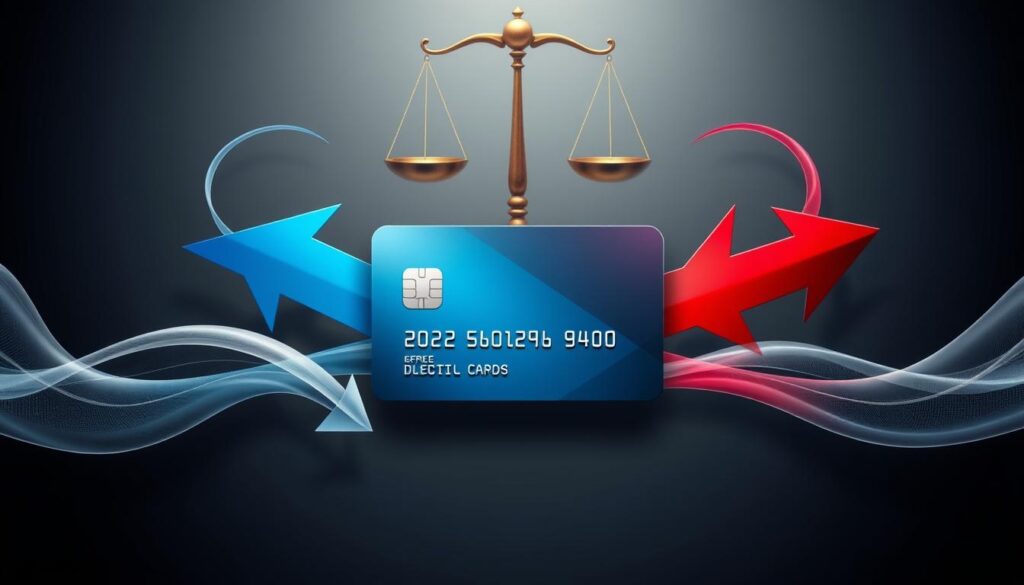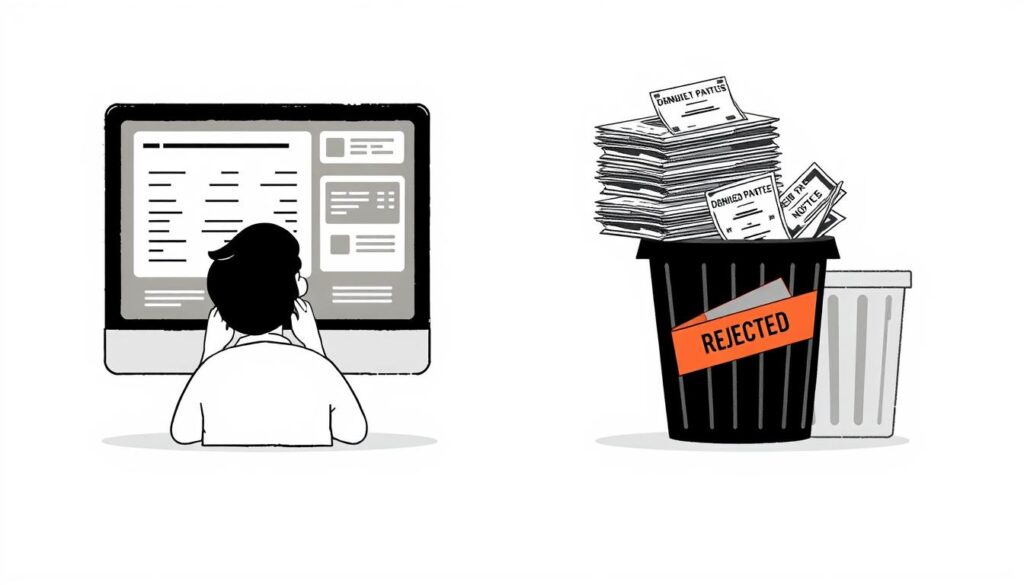A denied credit card dispute can be frustrating for consumers. It may leave you feeling powerless, but the process isn’t over yet. You still have rights and options to contest the decision.
Disputes can involve billing errors, unauthorized charges, or unsatisfactory merchandise. Regardless of the reason, you can take action if your claim is rejected.
Key Takeaways
- Understand the common reasons for dispute denials and their impact on your credit score.
- Know your chargeback rights and the limitations of the dispute process.
- Learn how to effectively appeal a denied dispute and escalate the issue.
- Familiarize yourself with credit card company policies and merchant dispute guidelines.
- Explore consumer protection laws, such as the Fair Credit Billing Act, to safeguard your rights.
Understanding Dispute Denials
Credit card disputes can be tricky. It’s important to know why claims get denied. Credit card companies and merchants have their own rules for handling disputes.
Knowing why denials happen can help you deal with them better. It’s also useful to understand how denials affect your credit score.
Common Reasons for Denial
Not having enough proof is a big reason for denials. If you can’t back up your claim, the credit card company might side with the merchant.
Merchants can also fight back. They may show their own proof to justify the charge.
Breaking credit card company rules can lead to denied claims. Each company has its own timelines and guidelines for disputes.
Impact on Credit Score
A denied dispute can hurt your credit score. The original charge stays on your account, which can raise your credit use ratio.
Your credit report might show the denied dispute. This could make lenders view you as less creditworthy.
| Reason for Denial | Potential Impact on Credit Score |
|---|---|
| Insufficient Evidence | Increased credit utilization, negative mark on credit report |
| Violation of Credit Card Company Policies | Increased credit utilization, negative mark on credit report |
| Merchant Contest | Increased credit utilization, negative mark on credit report |
Knowing about dispute resolution is key. It helps you understand denials and their effects on your credit score.
Being prepared and informed can boost your chances of winning a dispute. Stay proactive to handle credit card issues effectively.
Chargeback Rights and Limitations
The Fair Credit Billing Act (FCBA) protects credit card users. It sets guidelines for the chargeback process. Knowing your chargeback rights helps you handle disputes better.
The FCBA lets you dispute unauthorized charges or billing errors. This includes charges for unaccepted or undelivered goods. Credit card companies must investigate and resolve disputes quickly.
However, the FCBA has specific rules. You must report disputes within 60 days of the first statement. Missing this deadline may hurt your case.
The FCBA doesn’t cover all disputes. It mainly deals with billing errors and unauthorized charges. Issues with product quality may not be covered.

“The Fair Credit Billing Act provides crucial consumer protections, but it’s important to understand its limitations and requirements to ensure your disputes are handled effectively.”
Understanding the FCBA helps protect your financial interests. Know your chargeback rights to navigate disputes better. The Fair Credit Billing Act is key to consumer protection.
Appealing a Denied Dispute
You can appeal if your credit card company denies your initial dispute. Gather extra evidence to support your case. Then, follow the company’s dispute resolution process to escalate your appeal.
Gathering Supporting Evidence
Collect as much supporting evidence as possible for your appeal. This may include receipts, invoices, and merchant correspondence. Review the denial reason and address each point with relevant proof.
Escalating the Appeal Process
After gathering evidence, escalate the appeal with your credit card company. Speak with a supervisor or file a formal written appeal. Clearly explain your position and highlight key facts supporting your case.
The dispute resolution process can be tricky. Understanding your chargeback rights and credit card company policies helps. Follow proper steps and provide solid evidence to boost your appeal’s success chances.
Credit Card Company Policies
Credit card companies have distinct policies for resolving billing disputes. Knowing these differences is key to handling disputes and chargebacks effectively.
Varying Dispute Resolution Procedures
Major credit card issuers follow their own guidelines for billing disputes. These policies differ in several important areas.
Differences include timelines, documentation needs, and escalation options. They also vary in criteria for valid dispute reasons.
- Timelines for initiating and responding to disputes
- Documentation requirements for supporting evidence
- Escalation options if the initial dispute is denied
- Specific criteria for determining valid dispute reasons
Learning about credit card company policies helps consumers understand their rights better. It also guides them on steps to resolve billing issues successfully.

Knowledge of these procedures prepares consumers for the dispute resolution process. It helps them achieve better outcomes when facing denied claims or unresolved billing issues.
What Happens If My Dispute Is Denied
A denied credit card dispute can be frustrating. But don’t worry, you still have options. Understanding the process and your rights is key.
If your dispute is denied, you can take action. You may appeal the decision with new evidence. Or, you could try alternative dispute resolution methods like mediation.
In some cases, filing a complaint might be necessary. The Consumer Financial Protection Bureau can help address issues. Knowing your Fair Credit Billing Act rights is also crucial.
The dispute process can be tricky, but don’t give up. Keep advocating for yourself as a consumer. Understanding the steps and resources available can improve your chances of success.
Merchant Dispute Guidelines
Merchant dispute guidelines are crucial for handling chargebacks and customer disputes. Understanding these procedures can help consumers navigate the dispute process more effectively. Merchants have specific requirements for addressing these situations.
Responding to Chargebacks
Merchants must provide evidence to justify their charges. This may include receipts, shipping records, or other supporting information. They have a limited time to respond to customer-initiated chargebacks.
Failure to provide evidence may result in automatic chargeback acceptance. Even if the merchant believes the charge was legitimate, they must act quickly.
Merchants can dispute chargebacks by presenting their case to the card issuer. This process requires careful adherence to card network guidelines and deadlines. Clear and compelling evidence is vital for a successful merchant dispute.
| Merchant Dispute Guidelines | Chargeback Rights |
|---|---|
| Provide evidence to justify charges | Customers have the right to dispute charges |
| Respond to chargebacks within a limited time frame | Card issuers will investigate disputed charges |
| Dispute chargebacks by following card network guidelines | Customers may be able to recover funds if the dispute is successful |
Grasping merchant dispute guidelines and their interaction with chargeback rights is key. This knowledge can improve your chances of a favorable outcome in the dispute process.

Fair Credit Billing Act
The Fair Credit Billing Act (FCBA) protects your rights in credit card billing disputes. It guides you through addressing errors or unauthorized charges on your statements. This law provides a framework for resolving such issues.
Consumer Protection Laws
The FCBA is part of broader consumer protection laws. These laws shield individuals from unfair practices in the credit industry. They give consumers rights to dispute billing errors without facing negative consequences.
Credit card companies must investigate and resolve billing disputes quickly. Consumers can withhold payment on disputed items until resolution. This is known as chargeback rights.
- The FCBA mandates that credit card companies must investigate and resolve billing disputes within a specific timeframe.
- Consumers are granted the right to withhold payment on disputed items, known as chargeback rights, until the issue is resolved.
- The law also prohibits credit card companies from reporting disputed charges as delinquent on a consumer’s credit report during the investigation period.
Understanding the FCBA helps consumers navigate credit card disputes confidently. It safeguards their financial well-being and provides peace of mind.
| Key Provisions of the Fair Credit Billing Act | Consumer Protections |
|---|---|
| Billing error notification | Consumers have 60 days to notify the credit card company of a billing error. |
| Investigation and resolution | Credit card companies must investigate and resolve disputes within 2 billing cycles (approximately 60 days). |
| Chargeback rights | Consumers can withhold payment on disputed items until the issue is resolved. |
| Credit report protection | Disputed charges cannot be reported as delinquent during the investigation period. |
The fair credit billing act and consumer protection laws empower consumers. They help address billing discrepancies and unauthorized charges effectively. These laws ensure your financial rights are protected.
Billing Error Disputes
The Fair Credit Billing Act protects you from incorrect credit card charges. You can dispute errors like wrong fees or unauthorized charges. Let’s explore how to handle these issues effectively.
The FCBA sets rules for addressing billing errors. You can challenge inaccurate or unauthorized charges. This includes double-billing, charges for canceled services, or wrong fees.
- Identify the Billing Error: Carefully review your credit card statement and identify the specific charge or fee that you believe is in error.
- Notify the Credit Card Company: Within 60 days of receiving the statement with the error, you must inform your credit card issuer in writing about the billing error. Provide a clear and detailed explanation of the issue.
- Withhold Payment: You are not required to pay the disputed amount while the investigation is ongoing, and the credit card company cannot take any action to collect the disputed amount or report it as delinquent.
- Provide Supporting Documentation: Gather any relevant documentation, such as receipts, contracts, or correspondence, to support your claim of a billing error.
- Await the Investigation: The credit card company must acknowledge your dispute within 30 days and complete its investigation within 90 days. During this time, they are prohibited from taking any adverse action against you.
- Resolution: If the credit card company determines that a billing error has occurred, they must correct the error and credit your account accordingly. If they find no error, they must provide a written explanation of their findings.
Knowing the Fair Credit Billing Act helps you fight billing errors. You can protect your finances by understanding your rights. This knowledge ensures quick fixes for wrong charges.
| Key Provisions of the Fair Credit Billing Act | Consumer Protections |
|---|---|
| Billing error disputes | Allows consumers to dispute billing errors, including unauthorized charges, within 60 days |
| Investigation and resolution | Requires credit card companies to investigate disputes and resolve them within 90 days |
| Liability for unauthorized charges | Limits consumer liability for unauthorized charges to $50 or less |
| Billing statement accuracy | Ensures credit card statements accurately reflect transactions and charges |
The Fair Credit Billing Act gives you power over your finances. You can fight unfair charges and keep your money safe. Learn the rules to stay in control.
Unauthorized Charge Disputes
You can dispute unauthorized charges on your credit card. This includes fraudulent transactions where your card info is used without consent. Let’s explore how to dispute these charges and understand your chargeback rights.
Fraudulent Transactions
Notice unauthorized charge disputes or fraudulent transactions on your statement? Act fast! Contact your credit card company right away. They’ll start an investigation and give you dispute forms.
Gather all relevant docs like receipts and statements. Submit the dispute form within 60 days of the transaction. Explain the unauthorized charge and why you think it’s fraudulent.
Keep an eye on your dispute’s progress. Answer any questions from your credit card company promptly.
- Gather all relevant documentation, such as receipts, statements, and any communication with the merchant.
- Submit the dispute form within the specified timeframe, usually within 60 days of the transaction.
- Provide a detailed explanation of the unauthorized charge and why you believe it to be fraudulent.
- Monitor the progress of your dispute and respond to any additional requests for information from your credit card company.
The Fair Credit Billing Act protects you from fraudulent transactions. You’re not liable for unauthorized charges. Your credit card company must investigate and remove these charges.
“Unauthorized charges can be a headache, but understanding your chargeback rights is the key to a successful dispute.”
Stay alert! Check your credit card statements often. Spot and address unauthorized charge disputes quickly. Fast action protects your finances and credit history.
Disputing Transactions
Credit card disputes have strict timelines and deadlines. Missing these can lead to serious issues. It’s vital to know the process and act quickly.
Timelines and Deadlines
The Fair Credit Billing Act gives you 60 days to start a disputing transactions claim. This countdown begins when the charge appears on your statement. Missing this deadline may result in your dispute being denied.
After you file, the credit card company has 30 days to investigate. They must provide a written explanation of their findings. If they find the charge valid, you’ll need to pay it.
However, if your dispute is valid, the charge will be removed. This protects your chargeback rights.
| Dispute Timeline | Deadline |
|---|---|
| Initiate dispute | Within 60 days of charge appearing on statement |
| Credit card company investigation | 30 days |
Understanding these timelines is crucial for handling disputing transactions correctly. Being organized and proactive can greatly improve your dispute’s outcome.

Alternative Dispute Resolution
Credit card disputes can be frustrating when denied. Alternative dispute resolution methods offer cost-effective solutions. These methods help resolve issues without lengthy legal battles.
Mediation and arbitration are two common options. In mediation, an impartial third party helps negotiate a settlement. Arbitration involves an arbitrator making a binding decision.
Small claims court is another alternative. Individuals present their case to a judge for potential damages. This process is typically faster and cheaper than traditional litigation.
It’s important to understand the process before choosing a method. Knowing the timeline and potential outcomes is crucial. Careful preparation and strong evidence can improve your chances of success.
| Alternative Dispute Resolution Method | Key Characteristics |
|---|---|
| Mediation | – Facilitated by an impartial third-party mediator – Parties negotiate to reach a mutually agreeable settlement |
| Arbitration | – Binding decision made by an arbitrator – More formal process than mediation |
| Small Claims Court | – Faster and less expensive than traditional litigation – Monetary limits on the amount that can be recovered |
These options offer efficient ways to resolve credit card disputes. They can be helpful when standard processes fail. Consider exploring these alternatives for a satisfactory outcome.
Preventing Future Disputes
Dealing with billing issues can be frustrating. However, you can take steps to avoid future problems. Understanding policies, following guidelines, and keeping records can help prevent denied disputes.
Understand Credit Card Company Policies
Each credit card provider has unique dispute handling rules. Review your card’s policies to learn about their process and requirements. This knowledge will help you submit better claims and improve your chances of success.
Follow Merchant Dispute Guidelines
Stick to merchant-specific dispute protocols. This may involve direct contact, providing evidence, or following timelines. Following their rules shows good faith and increases chances of a positive outcome.
Keep Meticulous Records
- Maintain detailed records of all purchases, including receipts, order confirmations, and any correspondence with the merchant.
- Document every step of the dispute resolution process, including dates, actions taken, and the responses received from the credit card company or merchant.
- Organize your documentation in a way that makes it easy to reference and present as evidence if needed.
Taking these steps can greatly reduce future billing disputes. It also makes the process smoother if an issue does come up. Being proactive helps protect your finances.
Conclusion
This guide delves into credit card dispute resolutions. It’s crucial to know your rights and options when facing a denied dispute.
We’ve covered denial reasons, appeals, and alternative resolution methods. Understanding the dispute resolution process and your chargeback rights is key to advocating for yourself.
The journey might be complex, but staying informed helps. With the right knowledge, you can tackle what happens if my dispute is denied scenarios effectively.
By being proactive, you can overcome challenges and protect your finances. Armed with these tools, you’ll be ready to resolve disputes and maintain good credit.

